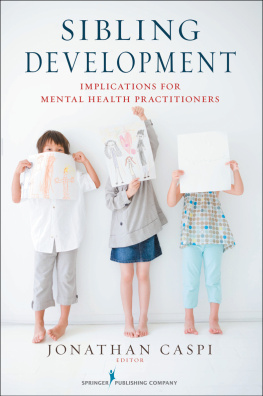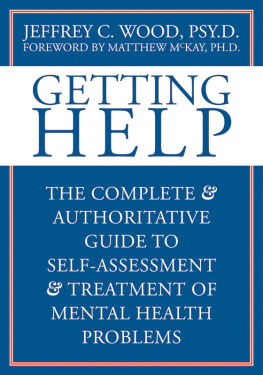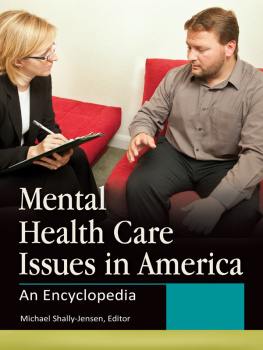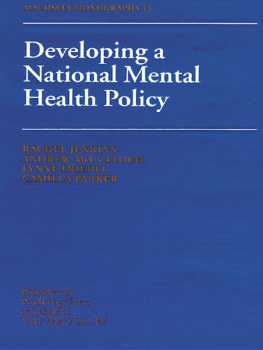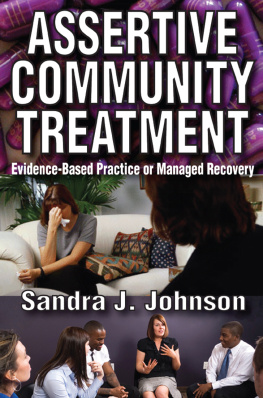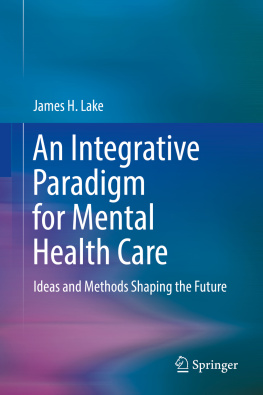This second edition first published 2011
2011 Daniel L. Segal, Sara Honn Qualls, and Michael A. Smyer
Edition history: Blackwell Publishers (1e, 1999)
Blackwell Publishing was acquired by John Wiley & Sons in February 2007. Blackwells publishing program has been merged with Wileys global Scientific, Technical, and Medical business to form Wiley-Blackwell.
Registered Office
John Wiley & Sons Ltd, The Atrium, Southern Gate, Chichester, West Sussex, PO19 8SQ, United Kingdom
Editorial Offices
350 Main Street, Malden, MA 02148-5020, USA
9600 Garsington Road, Oxford, OX4 2DQ, UK
The Atrium, Southern Gate, Chichester, West Sussex, PO19 8SQ, UK
For details of our global editorial offices, for customer services, and for information about how to apply for permission to reuse the copyright material in this book please see our website at www.wiley.com/wiley-blackwell.
The right of Daniel L. Segal, Sara Honn Qualls, and Michael A. Smyer to be identified as the authors of this work has been asserted in accordance with the UK Copyright, Designs and Patents Act 1988.
All rights reserved. No part of this publication may be reproduced, stored in a retrieval system, or transmitted, in any form or by any means, electronic, mechanical, photocopying, recording or otherwise, except as permitted by the UK Copyright, Designs and Patents Act 1988, without the prior permission of the publisher.
Wiley also publishes its books in a variety of electronic formats. Some content that appears in print may not be available in electronic books.
Designations used by companies to distinguish their products are often claimed as trademarks. All brand names and product names used in this book are trade names, service marks, trademarks or registered trademarks of their respective owners. The publisher is not associated with any product or vendor mentioned in this book. This publication is designed to provide accurate and authoritative information in regard to the subject matter covered. It is sold on the understanding that the publisher is not engaged in rendering professional services. If professional advice or other expert assistance is required, the services of a competent professional should be sought.
Library of Congress Cataloging-in-Publication Data
Segal, Daniel L.
Aging and mental health. 2nd ed. Daniel L. Segal, Sara Honn Qualls, and Michael A. Smyer.
p. cm. (Understanding aging)
Smyers name appears first on the earlier edition.
Includes bibliographical references and index.
ISBN 978-1-4051-3075-2 (pbk.: alk. paper) ISBN 978-1-4443-9086-5 (ebk) 1. Older people Mental health. 2. Geriatric psychiatry. I. Qualls, Sara Honn. II. Smyer, Michael A. III. Title.
RC451.4.A5S66 2011
618.97'689dc22
2010021917
A catalogue record for this book is available from the British Library.
Printed in Malaysia
[001] [2011]
Daniel L. Segal: To Cindy and Shaynie
Sara H. Qualls: To Mark, Morgan, Lea, and Marcus
Michael A. Smyer: To Piper, Brendan, and Kyle
Preface
What is important in knowledge is not quantity, but quality. It is important to know what knowledge is significant, what is less so, and what is trivial.
(Leo Tolstoy)
In this book we have tried to take Tolstoys maxim to heart, sorting out the significant from the trivial in the domain of aging and mental health. As we did so, we had two audiences in mind: todays clinicians and the clinicians of the future. The first group includes clinicians who are already in practice settings but who want to know more about the intricacies of working with older adults. The second group encompasses students in the professions that work with older adults (e.g., psychology, social work, nursing, psychiatry).
Both groups must face the issues of aging summarized by Michel Philibert, a French philosopher: Of aging, what can we know? With aging, what must we do? (Philibert, 1979, p. 384). These are also issues that older adults and their family members must face. In a way, they are variations on the questions that often arise in clinical settings. Consider the following example:
Betty was worried about Alex. His memory seemed to be failing him more often. Hed get to the store and forget half of the things shed sent him there for. He seemed more tired than usual, with less energy for his hobbies at the end of the day or on weekends. He didnt want to go out with friends to the movies or to dinner. Alex didnt notice anything different in his behavior. Betty called to ask your advice: Should I get him tested at the local Alzheimers Center?
How would you answer Betty? What would you need to know? Which portion of her story is significant in forming your answer? Which less so?
In answering these questions, you are implicitly answering Philiberts queries as well. You are implicitly making a differential diagnosis of Alexs situation: Is this a part of normal aging? Is this a pathological pattern? Is it a combination of the two? (Of aging, what can we know?)
You may also be linking your answer to an implicit action plan. Betty certainly is: Diagnose the problem and then decide what kind of treatment is most appropriate. (With aging, what must we do?)
To fully answer Bettys question requires much more information about aging in general, about patterns of mental health and mental disorder in particular, about Alexs distinctive history and pattern of functioning, and about the contexts in which she and Alex live and receive services. This book is designed to provide you with frameworks for considering each element.
Part I is an overview of basic gerontology, the study of the aging process. This background information forms a context for answering the simple question often posed by clients and their relatives: Should I be worried about this pattern of behavior (e.g., Alexs apparent memory problems)? To answer this deceptively simple question requires that we sort out the influences of physical illness, basic processes of aging, and the intersection of historical and social trends as they affect older adults functioning. In Part I we outline the basic parameters of mental health in later life, providing the foundation upon which later chapters build.
In Part II we consider basic models of mental disorders. Each model provides a set of assumptions about mental health and the development of mental health problems, their assessment, and their treatment. These assumptions direct the clinicians attention to specific aspects of older adults and their functioning. For example, assume for the moment that Alexs memory problems are not organically caused. The behavioral perspective might highlight the context of the older adults behavior. Several important models of mental health and mental disorder are outlined in the chapters of Part II. In each chapter we focus on an important question for older adults and those who work with them: How is this approach relevant to older adults and the problems they encounter in later life?
The third and final part focuses attention on the most commonly occurring mental health problems and disorders in later life: cognitive impairment, depression, serious mental disorders (e.g., schizophrenia), anxiety, substance use, personality disorders, and other common disorders. In each chapter we outline the prevalence of the disorders, the most appropriate assessment approaches for older adults, and the most effective treatment strategies for older adults. We were fortunate to be able to call upon Stephen J. Bartels for his expertise in the diagnosis and treatment of chronic mental disorders (Chapter 9). Part III concludes with a capstone chapter on the contexts and settings of geriatric mental health practice. One physical setting is particularly important in geriatric mental health care: nursing homes. Although they were not designed for it, they are a major treatment setting for mentally ill older adults. Of course, other contexts (e.g., health care settings, social service settings, legal issues) affect how, where, and why mentally ill older adults are diagnosed and treated. We discuss these contexts in this final chapter.




